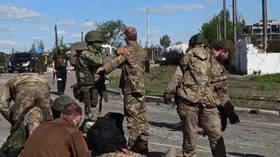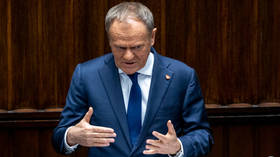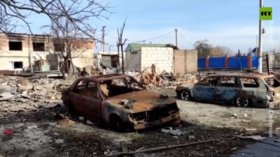Russia reveals number of Azovstal captives
A total of 959 Ukrainian troops previously holed up in a steel plant in Mariupol have surrendered this week, the Russian Defense Ministry said in a Wednesday morning briefing. Kiev expects them to be exchanged, while prosecutors in Russia are looking at the possibility of bringing many to trial.
The number of captives has increased by 694 over the last 24 hours, military spokesman Major General Igor Konashenkov said. Among them were 80 with injuries, of which 51 received treatment at a hospital provided by the Russian-allied Donetsk People’s Republic (DPR), the official said.
The Azovstal plant was the last bastion of Ukrainian forces in Mariupol, a key port city claimed by the DPR as part of its territory. Russian and allied troops declined to storm the massive site and instead blockaded it.
Kiev confirmed it ordered the troops to surrender, though President Volodymyr Zelensky described it as an evacuation.
“The operation to rescue the defenders of Mariupol was initiated by our military and our intelligence officers with the goal to return them home. The work continues and this work requires tact and time,” he said.
The Russian Defense Ministry released footage on Wednesday showing unarmed Ukrainian troops leaving Azovstal. Russian soldiers searched them before allowing them to leave by bus or ambulance, the video shows. Transport columns were escorted by military vehicles. The Ukrainian troops are understood to be held in custody by the DPR.
Ukrainian officials made it clear that they expect the captured soldiers to be exchanged for Russian prisoners of war. However, many of the fighters belong to the ultranationalist Azov Battalion, which Russia accuses of various war crimes.
A draft law was submitted to the Russian parliament on Tuesday that would classify Azov as a terrorist organization. A similar request was sent by the Prosecutor General’s Office to the Supreme Court of Russia. If the classification is adopted, it would open up a legal path for the prosecution of all Azov members for being in the ranks of the unit rather than for specific crimes. The regiment is formally part of Ukraine’s National Guard.
Russia attacked the neighboring state in late February, following Ukraine’s failure to implement the terms of the Minsk agreements, first signed in 2014, and Moscow’s eventual recognition of the Donbass republics of Donetsk and Lugansk. The German- and French-brokered protocols were designed to give the breakaway regions special status within the Ukrainian state.
The Kremlin has since demanded that Ukraine officially declare itself a neutral country that will never join the US-led NATO military bloc. Kiev insists the Russian offensive was completely unprovoked and has denied claims it was planning to retake the two republics by force.














